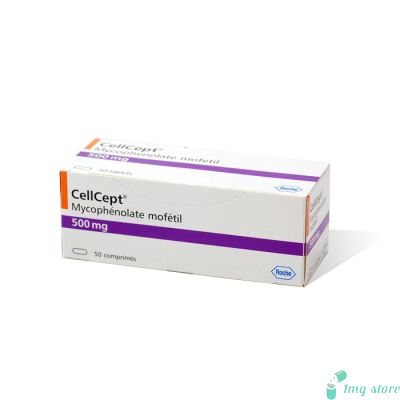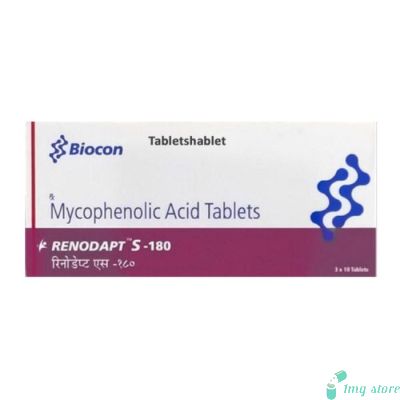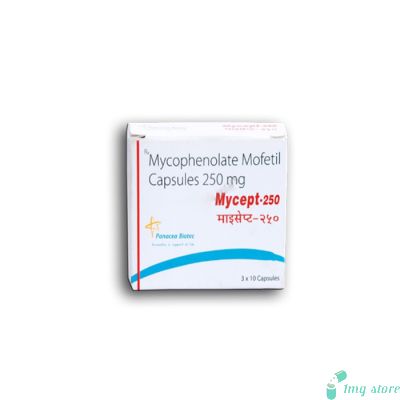Mycofit Tablet (Mycophenolate Mofetil)
Mycophenolate, marketed under the brand name Mycofit and commonly known as Cellcept, is an immunosuppressive medication that has revolutionized the treatment of various autoimmune diseases and transplant rejection.
Mycophenolate Tablet (Mycofit): Effectiveness in Immunosuppression Treatment
Mycophenolate, marketed under the brand name Mycofit and commonly known as Cellcept, is an immunosuppressive medication that has revolutionized the treatment of various autoimmune diseases and transplant rejection. It belongs to a class of drugs called mycophenolic acid derivatives and is available in tablet form. Mycophenolate acts by inhibiting the proliferation of immune cells, thereby reducing the body's immune response. This comprehensive guide will delve into the dosage information, uses, and effectiveness of Mycophenolate Tablet (Mycofit) in immunosuppression treatment.
Dosage Information:
The dosage of Mycophenolate Tablet (Mycofit) varies depending on the specific condition being treated and the individual patient's characteristics. It is crucial to consult a healthcare professional for personalized dosage instructions. However, the generally recommended starting dose for adults is 1 gram (1000 mg) administered twice daily. For pediatric patients, the dosage is calculated based on body surface area or body weight. The tablets should be swallowed whole with water, preferably on an empty stomach, at least one hour before or two hours after a meal.
Mycophenolate and Immunosuppression:
Immunosuppression is the primary mechanism of action for Mycophenolate Tablet (Mycofit). By inhibiting the proliferation of T and B lymphocytes, Mycophenolate disrupts the production of antibodies and suppresses the immune response. This targeted immunosuppression is crucial in preventing rejection in organ transplant recipients and managing autoimmune diseases.
Mycophenolate Effectiveness:
Mycophenolate has demonstrated remarkable effectiveness in multiple clinical trials and real-world settings. In organ transplantation, it has significantly improved graft survival rates by reducing the incidence of acute rejection. Furthermore, Mycophenolate has shown better efficacy compared to other immunosuppressive agents in the treatment of lupus nephritis and other autoimmune diseases.
Mycophenolate Treatment:
Initiation: When starting Mycophenolate treatment, patients are closely monitored to assess their response and potential side effects. Regular blood tests are conducted to ensure optimal dosage adjustment and therapeutic efficacy.
Maintenance: Once the desired immunosuppressive effect is achieved, the patient is typically maintained on a stable dose of Mycophenolate, which may be adjusted periodically based on individual response, drug interactions, and potential adverse effects.
Combination Therapy: Mycophenolate is often used in combination with other immunosuppressive medications to achieve a synergistic effect and minimize the risk of rejection or disease flare-ups. The choice of combination therapy depends on the specific condition
You Must Know Some Safeguards While Using Mycofit Tablet (Mycophenolate Mofetil)
Before initiating Mycophenolate Tablet (Mycofit) treatment, it is essential to consider certain precautions to ensure the safety and efficacy of the medication. These precautions include:
Allergies: Individuals with known hypersensitivity or allergy to mycophenolate or any of its components should avoid using Mycofit.
Pregnancy and Breastfeeding: Mycophenolate/Cellcept can harm an unborn baby and may cause birth defects. Therefore, it is crucial to discuss the risks and benefits of Mycofit with a healthcare professional before using it during pregnancy or while breastfeeding.
Immunization: Live vaccines should be avoided during Mycophenolate treatment due to the potential risk of infection. It is recommended to complete all necessary vaccinations before starting the medication.
Infections: Mycophenolate may increase the risk of developing infections, including viral, bacterial, and fungal infections. Patients should be vigilant for any signs of infection and promptly seek medical attention if symptoms arise.
Kidney and Liver Disease: Individuals with severe kidney or liver impairment may require dosage adjustments or close monitoring while taking Mycophenolate. A healthcare professional should be consulted to determine the appropriate dose in these cases.
Primary Utilization of Mycophenolate Tablet (Mycofit)
Organ Transplantation: Mycophenolate Tablet (Mycofit) is widely used to prevent organ rejection in patients who have undergone kidney, heart, or liver transplants. It is typically used in combination with other immunosuppressive medications, such as corticosteroids and calcineurin inhibitors, to create a comprehensive regimen tailored to each patient's needs.
Autoimmune Diseases: Mycophenolate Tablet (Cellcept) is also effective in managing various autoimmune diseases, including systemic lupus erythematosus (SLE), rheumatoid arthritis, and vasculitis. It helps to control disease activity, reduce inflammation, and prevent damage to affected organs.
Lupus Nephritis: Mycophenolate has shown remarkable efficacy in treating lupus nephritis, a severe manifestation of SLE affecting the kidneys. It can help improve renal function, reduce proteinuria, and prevent disease progression.
Like any medication, Mycophenolate Tablet (Mycofit) has Common Secondary effects including:
Gastrointestinal Effects: Mycophenolate/Cellcept can cause stomach upset, nausea, vomiting, diarrhea, and abdominal pain. Taking the medication with food or using antacids may help alleviate these symptoms.
Infections: Mycophenolate can increase the risk of infections, including respiratory tract infections, urinary tract infections, and fungal infections. Prompt medical attention is necessary if any signs of infection develop.
Blood Disorders: Mycophenolate may affect the production of blood cells, leading to decreased white blood cell count (leukopenia), decreased red blood cell count (anemia), and decreased platelet count (thrombocytopenia). Regular blood tests are conducted to monitor these parameters.
Liver and Kidney Dysfunction: Mycophenolate can occasionally cause liver and kidney function abnormalities. Monitoring liver and kidney function is necessary during treatment.
Skin Reactions: Rashes, itching, and increased sensitivity to sunlight (photosensitivity) may occur with Mycofit. It is important to protect the skin from excessive sun exposure and notify a healthcare professional
Help Section About Mycophenolate Tablet (Mycofit)
Can Mycophenolate Tablet (Mycofit) be taken with other neurology medications?
Answer: Mycophenolate can interact with certain neurology medications, potentially affecting their effectiveness or increasing the risk of side effects. It is crucial to consult with a healthcare professional or pharmacist regarding the specific neurology medications you are taking to assess any potential drug interactions and determine the appropriate course of action.
Are there any specific precautions for using Mycophenolate Tablet (Mycofit) in cancer patients?
Answer: Mycophenolate is primarily used as an immunosuppressive medication and is not commonly prescribed as an anti-cancer agent. However, if Mycofit is being used in combination with other anti-cancer drugs, it is essential to discuss the treatment plan and potential interactions with a healthcare professional. They can provide guidance on precautions and ensure the safety and efficacy of the combined therapy.
Can Mycophenolate Tablet (Mycofit) be abruptly discontinued?
Answer: It is not recommended to abruptly discontinue Mycophenolate without consulting a healthcare professional. Sudden discontinuation can increase the risk of organ rejection in transplant patients or disease flare-ups in autoimmune conditions. A healthcare professional will guide patients on the appropriate tapering schedule or discontinuation plan based on their specific medical condition.
Can Mycophenolate Tablet (Mycofit) be used in pediatric patients?
Answer: Mycophenolate can be prescribed to pediatric patients based on their specific medical conditions and individual needs. The dosage for children is determined based on body surface area or body weight. It is important to work closely with a pediatric specialist or healthcare professional to determine the appropriate dosage and monitor the child's response to the medication.
Are there any specific side effects of Mycophenolate Tablet (Mycofit) in the elderly population?
Answer: While the general side effects of Mycophenolate can occur in the elderly population as well, it is important to note that older individuals may be more susceptible to certain adverse effects. These can include a higher risk of infections, gastrointestinal disturbances, and drug interactions. Regular monitoring by a healthcare professional is essential to assess and manage any potential side effects in elderly patients.
Less But Potential Drug Interconnection with Mycophenolate Tablet (Mycofit)
Mycophenolate Tablet (Mycofit) can interact with other medications, potentially altering their effectiveness or increasing the risk of side effects. Some notable drug interactions include:
Antacids: Antacids containing aluminum or magnesium hydroxide may reduce the absorption of Mycophenolate. It is recommended to take Mycofit at least two hours before or after taking antacids.
Cholestyramine and Sevelamer: These medications used to lower cholesterol and manage phosphate levels in kidney disease can significantly reduce the absorption of Mycophenolate. They should be taken at least two hours after Mycofit.
Acyclovir and Ganciclovir: These antiviral drugs can increase the blood levels of Mycophenolate, potentially leading to an increased risk of side effects. Close monitoring is necessary when using these medications together.
Vaccines: Mycophenolate/Cellcept may reduce the effectiveness of vaccines. It is advisable to consult with a healthcare professional regarding the appropriate timing of vaccinations and Mycophenolate administration.
| Manufacturer | : | Intas Pharma, India |
| Equivalent Brand | : | Cellcept |
| Generic Search | : | Mycophenolate Mofetil |











